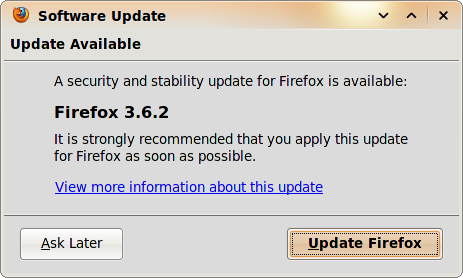Security
Firefox 3.6.2 security and stability update has been released for all platforms, you can download the new version from the Mozilla website or simply update your current Firefox 3,6, yes Firefox 3.6. Now, don’t think you missed Firefox 3.6.1, it was never released, Mozilla skipped “the version number of Firefox 3.6.1 in order to stay in sync with platform”. More»
Posted in Firefox, Open-Source, Security, Ubuntu, Windows | 2 Comments »
Mozilla has dropped support for the 1.x series of its all-in-one internet application suite, SeaMonkey. SeaMonkey 1.0 was released four years ago and v1.1 came a year later (v.1.1 is three years old). Today, SeaMonkey project hasdecided to discontinue the 1.x series in favor of the more modern and secure SeaMonkey 2.x. More»
Posted in Email, Open-Source, Security, Ubuntu, Windows | 1 Comment »
It seems a security bug in Firefox 3.6 RC 1, Linux version has pushed Mozilla to build a second release candidate of Firefox 3.6. This built is already available for download, but release notes are not yet available so much can’t be said. Mozilla is also considering to officially release Firefox 3.6 final on Tuesday January 19, if other bugs don’t pop-up and if this update is enough to harness this bug – If not Firefox 3.6 will be shipped on Jan 26.
Sources: Mozilla Wiki – Upcoming Product Releases | The Official Win32 20100115 Branch build is out
Posted in Firefox, Open-Source, Security, Ubuntu, Windows | 4 Comments »
A simple trick you can quickly deploy to prevent your email addresses from scrappers is use to display them in an image format. That’s exactly how Facebook deals with our email addresses to prevent friends and spambots from scrapping them. So if you need an email image and don’t have time to create one, then just export your Facebook-generated email images. More»
Posted in Email, Security, Web Utilities | Comments Off on Use Facebook to Protect Your Email Address from Scrappers
Better watch out for this country domains, according to McAfee they are the riskiest country domains online for 2009. Cameroon takes the lead, it seems the dot cm (.cm) used by this West African nation attracts cyber-criminals who setup fake typo sites with the aim of capitalizing on .cm which is a common typo for .com.
One in three .cm domains harbour malware.
“Cybercriminals target regions where registering sites is cheap and convenient, and pose the least risk of being caught.” More»
Posted in Security, Web Hosting | Comments Off on McAfee’s Top Five Riskiest Country Domains





